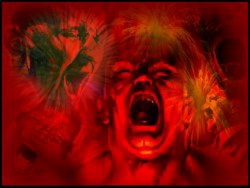Anger
- See also :
- See also :
anger
瞋恚・瞋 (Skt dvesha; Pali dosa; Jpn shinni or shin )A deluded mental factor that observes its contaminated object, exaggerates its bad qualities, considers it to be undesirable, and wishes to harm it. Anger (kodha) is the feeling of negativity experienced when one’s desires are frustrated. The Buddha said that because of anger’s ability to churn up the mind anger is one of the most destructive of all human emotions. Buddhist psychology recognises numerous expressions and intensities of anger – mild irritation, annoyance, bad temperedness, exasperation, resentment, umbrage, fury etc, and offers a wide variety of techniques to deal with it. It is of course, necessary to hold anger in check but beyond that one has to deal with its roots. There is a strong relationship between anger and desire – the stronger our desire, the angrier we get when that desire is frustrated. Thus, the first step in coming to terms with anger is modifying desires. Anger will, however, only be completely eliminated when the ego or sense of self is understood.
==Releasing Anger==
In 1995, Daniel Goleman, published the best-seller, Emotional Intelligence.In this book he showed that more than intellectual intelligence, such as I.Q., what is a far greater scale of a person’s success is how well they deal with social and emotional issues. Emotional intelligence refers to getting along with others, knowing how and when to act, not letting things bother you, and success features, such as persistence, determination, and deferred gratification.
Dr. Goleman provides references from many studies to show the importance of the emotional skills for success. He explains how even residual amounts of anger (which some people feel are necessary toget theanger“off your chest”) leads to further, escalated anger. A person even with a small amount of anger can enter a “flooding” state, where there is an overwhelming amount of anger with adrenaline, where no rational decisions can be made in this state and it needs a long recovery time before settling down.Many people who have killed loved ones report that they “just snapped” in the heat of some arguments.(Goleman, 1995)
In Buddhism, one of the three poisons, or three sources of vice and suffering, the other two being greed and foolishness. In Buddhism, anger refers particularly to malice born of hatred and is regarded as a great obstacle to Buddhist practice. It is seen as preventing one's heart from turning to goodness and as destroying the good roots of benefit accumulated through Buddhist practice. T'ient'ai (538-597) says in The Words and Phrases of the Lotus Sutra, "Because anger increases in intensity, armed strife occurs." Buddhism emphasizes the practice of compassion and forbearance.
Anger (Kodha) is the Feeling of negativity experienced when one’s desires are frustrated. The Buddha said that because of anger’s ability to churn up the Mind, it is one of the most destructive of all human emotions. In the Saundrānandakāvya, Aśvaghoṣa says, ‘Another person in this World may not be harmed by a Mind of hateful intentions, but the person with such a Mind is burned up immediately. Therefore, you should choose Love and Compassion towards all living creatures, rather than hatred and aggression.’
Buddhist psychology recognizes numerous expressions and intensities of anger – mild irritation, annoyance, bad-temperedness, exasperation, fury, resentment, umbrage, etc, and offers a wide variety of techniques to deal with it. It is, of course, necessary to hold anger in check, but beyond that one has to deal with its roots. There is a strong relationship between anger and desire – the stronger our desire, the angrier we get when that desire is frustrated. Thus, the first step in coming to terms with anger is modifying desires. Anger will, however, only be completely eliminated when the ego or sense of self is understood.
Curbing Anger, Spreading Love, Bhikkhu Visuddhacara,1992.
